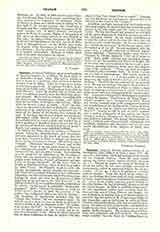

Ozanam, ANTOINE-FRÉDÉRIC, great grand-nephew of Jacques Ozanam, b. at Milan, April 23, 1813; d. at Marseilles, September 8, 1853. His father, settled at first in Lyons as a merchant, after reverses of fortune decided to go to Milan. Later he returned to Lyons and became a physician. At eighteen Frederic, in defense of the Faith, wrote “Reflexions sur la doctrine de Saint-Simon”. Later he studied law in Paris, and lived for eighteen months with the illustrious physician Ampere. He formed an intimate friendship with the latter’s son, Jean-Jacques Ampére, well known later for his works on literature and history. Meanwhile he became a prey of doubt. “God“, he said, “gave me the grace to be born in the Faith. Later the confusion of an unbelieving world surrounded me. I knew all the horror of the doubts that torment the soul. It was then that the instructions of a priest and philosopher (Abbé Noirot) saved me. I believed thenceforth with an assured faith, and touched by so rare a goodness, I promised God to devote my life to the services of the truth which had given me peace”. Rarely was a promise more faithfully fulfilled.
In 1836 he left Paris, where he had known Château-briand, Ballanche, Montalembert, and Lacordaire, and was appointed to the bench at Lyons, but two years later returned to Paris to submit his thesis on Dante for his doctorate in letters. His defense was a triumph. “Monsieur Ozanam”, Cousin said to the candidate, “there is no one more eloquent than you have just proved yourself.” He was given the chair of commercial law, just created at Lyons. The following year he competed for admission to the Faculties at Paris, and was appointed to substitute for one of the judges of the Sorbonne, Fauriel, philosopher and professor of foreign literature. At the same time he taught at Stanislas College, where he had been called by Abbé Gratry. On Fauriel’s death in 1844, the
Faculty unanimously elected Ozanam his successor. Like his friend Lacordaire he believed that a Christian democracy was the end towards which Providence was leading the world, and after the Revolution of 1848 aided him by his writings in the “Ere Nouvelle”. In 1846 he visited Italy to regain his strength, undermined by a fever. On his return he published “Etudes germaniques” (1847); “Poétes franciscains en Italic au XIIIe siècle”; finally, in 1849, the greatest of his works: “La civilisation chrétienne chez les Francs”. The Academy of Inscriptions awarded him the “Grand Prix Gobert” for two successive years. In
1852 he made a short journey to Spain an account of which is found in the posthumous work: “Un pélérinage au pays du Cid”. In the beginning of the next year, his doctors again sent him to Italy, but he returned to Marseilles to die. When the priest exhorted him to have confidence in God, he replied “Oh why should I fear God, whom I love so much?” Complying with his desire the Government allowed him to be interred in the crypt of the “Carmes”.
A brilliant apologist, impressed by the benefits of the Christian religion, he desired that they should be made known to all who might read his works or hear his words. To him the Gospel had renewed or revivified all the germs of good to be found in the ancient and in the barbarian world. In his many miscellaneous studies he endeavored to develop this idea, but was unable to fully realize his plan. In the two volumes of the “Etudes germaniques” he did for one nation what he desired to do for all. He also published, with the same view, a valuable collection of hitherto unpublished material: “Documents inédits pour servir à l’histoire de l’Italie, depuis le VIIIe siècle jusqu’au XIIe” (Paris, 1850). Ozanam was untiring in energy, had a rare gift for precision and historical insight, and at the same time a naturalness in his verse and a spontaneous, pleasing eloquence, all the more charming because of his frankness. “Those, who wish no religion introduced into a scientific work,” he wrote, “accuse me of a lack of independence. But I pride myself on such an accusation.. I do not aspire to an independence, the result of which is to love and to believe nothing.” His daily life was animated by an apostolic zeal. He was one of those who signed the petition addressed to the Archbishop of Paris to obtain a large body of religious teachers for the Catholic school children, whose faith was endangered by the current unbelief. As a result of this petition Monseigneur de Quélen created the famous “Conférences de Notre Dame”, which Lacordaire (q.v.) inaugurated in 1835. When but twenty, Ozanam with seven companions had laid the foundations of the Society of St. Vincent de Paul, in order, as he said to “insure my faith by works of charity”. During his life he was an active member and a zealous propagator of the society (see Society of Saint Vincent de Paul). With all his zeal, he was, however, tolerant. His strong, sincere books exhibit a brilliant and animated style, enthusiasm and erudition, eloquence and exactness, and are yet very useful introductions to the subjects of which they treat.
GEORGES BERTRIN

